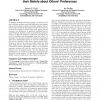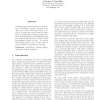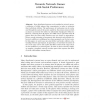674 search results - page 5 / 135 » Preferences in Game Logics |
ATAL
2008
Springer
13 years 9 months ago
2008
Springer
In strategic multiagent decision making, it is often the case that a strategic reasoner must hold beliefs about other agents and use these beliefs to inform its decision making. T...
EUSFLAT
2007
13 years 9 months ago
2007
A dialogue game based approach to the problem of providing a deeper semantic foundation for t-norm based fuzzy logics is explored. In particular, various versions, extensions and ...
FSTTCS
2009
Springer
14 years 2 months ago
2009
Springer
We suggest that extending Muller games with preference ordering for players is a natural way to reason about unbounded duration games. In this context, we look at the standard solu...
ECAI
2000
Springer
13 years 12 months ago
2000
Springer
Abstract. We describe an approach for compiling dynamic preferences into logic programs under the answer set semantics. An ordered logic program is an extended logic program in whi...
SIROCCO
2010
13 years 9 months ago
2010
Many distributed systems can be modeled as network games: a collection of selfish players that communicate in order to maximize their individual utilities. The performance of such ...



